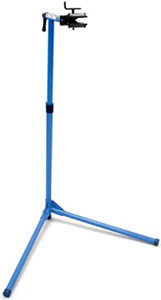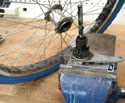Bicycle Tools List
|
One of the great things about bicycles is that they're relatively easy to maintain and repair. In most cases you can solve problems with the kit you carry on your bike, which should include a spare tube, tire levers, all-in-one tool and pump. This allows replacing the tube and handling minor issues, such as fine-tuning parts that loosen or go out of adjustment. As you master simple fixes, you may get interested in doing more involved repairs, such as replacing worn cables, cleaning the drivetrain, upgrading certain parts or even straightening wheel wobbles. These tasks and more are well within your capabilities if you have the right tools and a little know-how. This article outlines a tool list and supplies to equip you for these basic repairs. Some tools you may already own. Others are bicycle-specific instruments that we carry. There's no need to rush out and buy all these tools right away. Instead, assemble your selection as you need them. This approach ensures that you get tools that you really need for your brand and model of bicycle (tools required vary accordingly). How do you know which tools you need and how to use them? We recommend picking up a book about bicycle maintenance and visiting the Park Tool website, which includes informative explanations of their many bicycle tools and a complete repair section. And don't forget that we're always happy to advise, too! |
 A good stand makes repairs easier. |
|
|


 Alcohol: For cleaning rims and brake pads. Also great for installing handlebar grips.
Alcohol: For cleaning rims and brake pads. Also great for installing handlebar grips.


 Axle vise
Axle vise